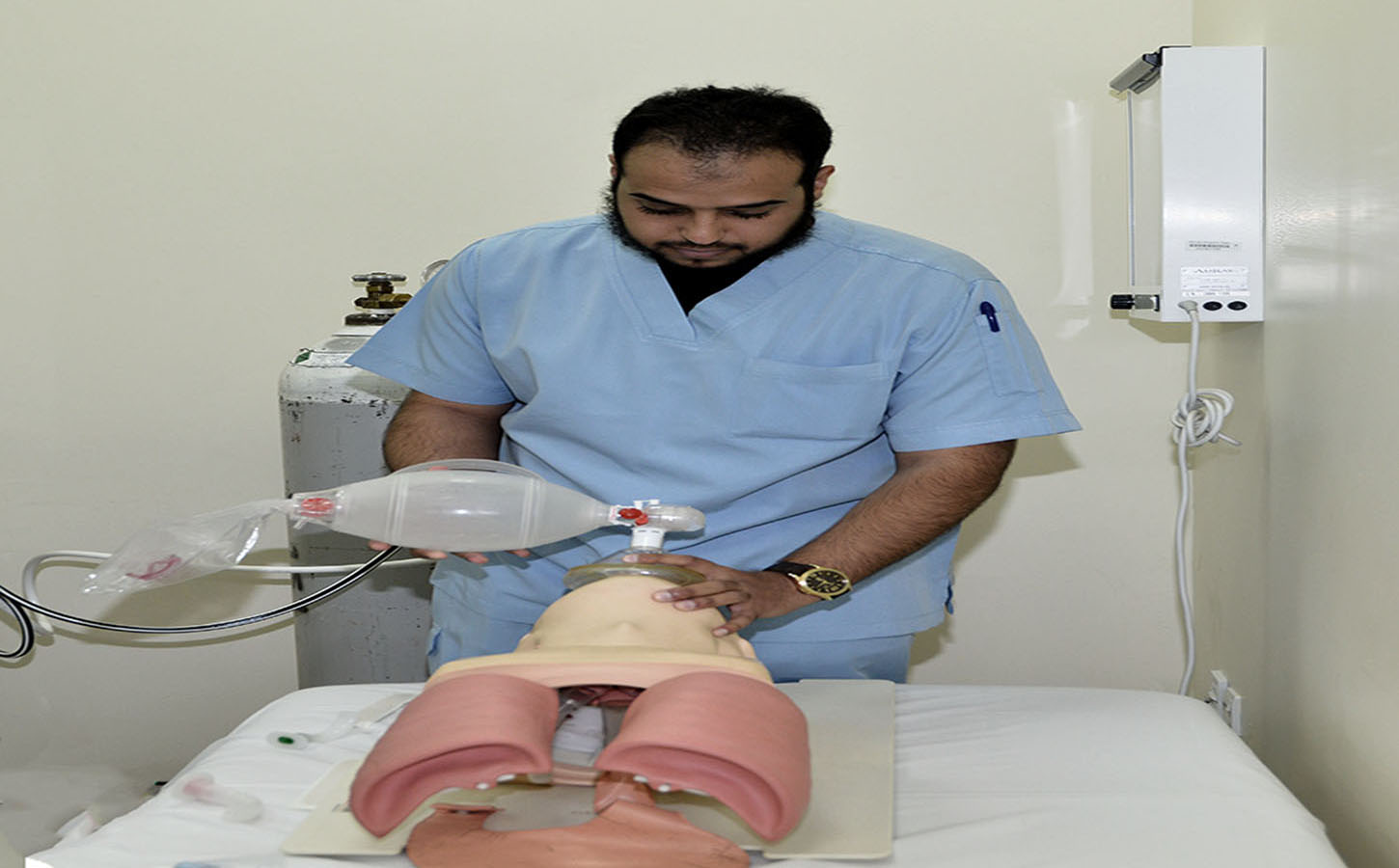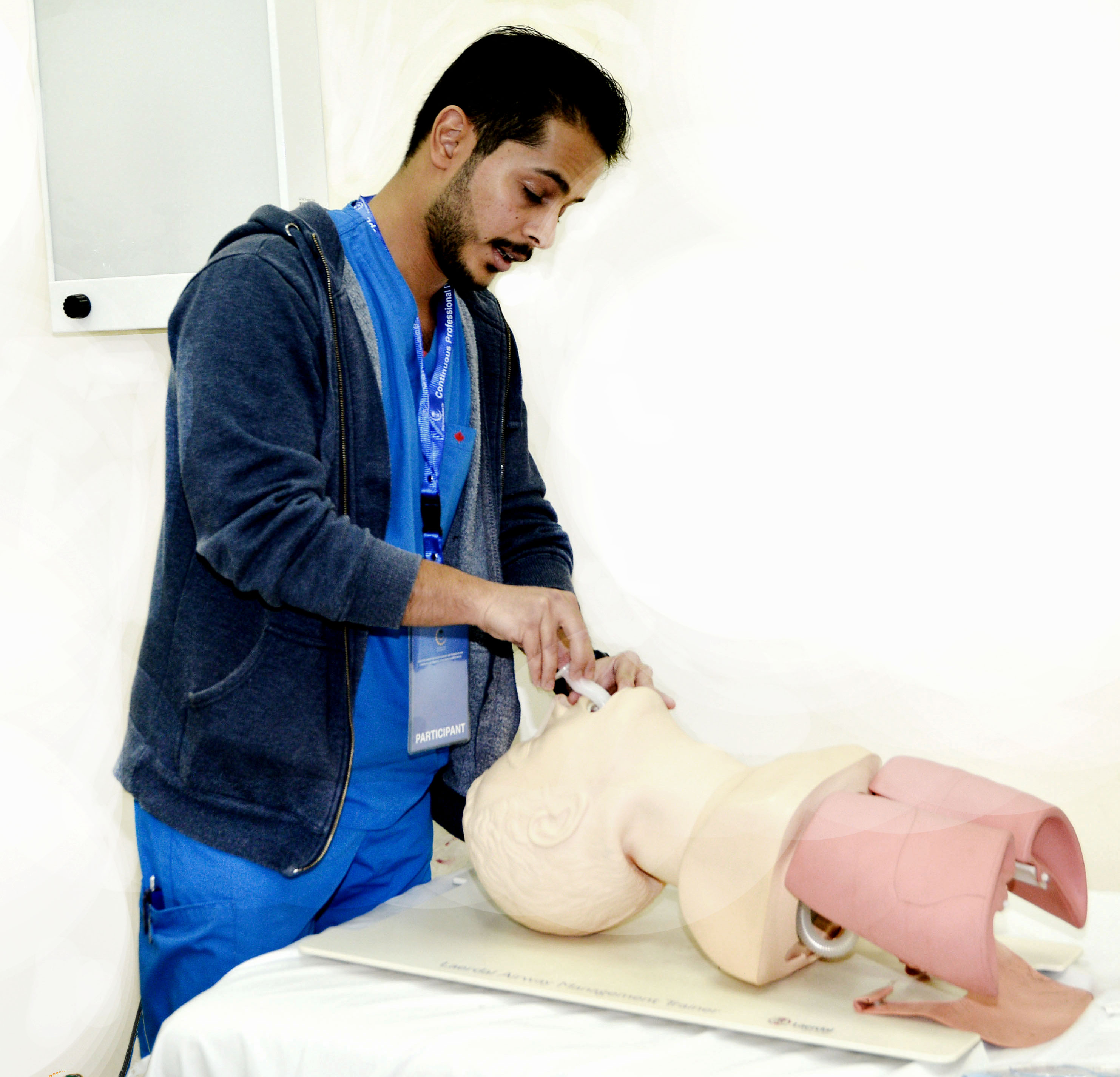1. Basic Life Support Provider Course
This course designed to provide Basic Life Support knowledge and skills of CPR for victims of all ages. It will teach the use of barrier device; e.g. pocket mask, bag-valve-mask, use of automated external defibrillator and relief of foreign body from the airway. It is designated to healthcare provider and people who are expected to respond to emergencies in the workplace. The center is accredited by the American Heart Association.
Objectives:
Upon completion of the course, the participant will be able to:
• Recognize importance of chain of survival
• Perform Adult, Pediatrics and infant CPR (1 and 2 rescuers)
• Know how to manage foreign body from the airway
• Ventilation with a barrier device
• Use of Automated External Defibrillator (AED).
Duration:
The course is one day course and is conducted daily through the year.
Number of instructors/trainees/capacity of the program: The course ratio is one instructor to six candidates.
Program design:
The program of the BLS based on the AHA guidelines in training utilizing an international version of lessons map, focuses on a teaching module called practice while watching. The course will is conducted in a classroom fully equipped by the recommended audiovisual system and training manikins. A Learning material is provided to the candidates in advance in order to be prepared for the course.
Admission Criteria:
• The course targeted all healthcare providers.
• Log book and Program statistics and other related official documentation:
Each course will have documentations; all the candidates will register themselves on the AHA website and receive their BLS Provider card and certificate of completion after the course. All the related documents are attached in appendix A1.
Appendix A1:
• Course registration sheet
• Copy of the course Agenda
• Course Practical test sheets
• Written test answer sheet
• The course results summary sheet
• Copy of the BLS card
• Copy of BLS certificate
2. ACLS Course Advance Cardiac Life Support Provider Course
The ACLS course is designed for medical providers such as physicians, nurses, respiratory therapists, paramedics and other professionals whose daily occupation requires them to either direct or participate in the resuscitation of a patient, whether in or out of hospital.
The Life Support Center at King Fahad Medical City is an authorized International Training Center for the American Heart Association for Advanced Cardiac Life Support Program. The center is accredited by the American Heart Association.
Objectives:
Upon completion of the course, the participant will be able to:
• Recognize the adult at risk of cardio-pulmonary arrest.
• Demonstrate the skills necessary for resuscitating and stabilizing the adult in respiratory failure, or cardiopulmonary arrest.
• Demonstrate the use of the various airway and oxygen adjuncts for optimum ventilation & airway control.
• Identify normal vs. abnormal cardiac rhythms and the appropriate pharmacologic and electrical therapies.
• Know the indications & dosages of medications used in cardio-pulmonary arrest.
• Perform advanced skills in the assessment and treatment of cardiopulmonary arrest in the adult patient.
Duration:
The course is two days course and is conducted three times per month.
Number of instructors/trainees/capacity of the program: The course ratio is one instructor to six candidates.
Program design:
The program of the ACLS based on the AHA guidelines in training utilizing an international version of lessons map, focuses on a teaching module called practice while watching and effective team dynamics. The course will is conducted in a classroom fully equipped by the recommended audiovisual system and training manikins. A Learning material is provided to the candidates in advance in order to be prepared for the course.
Admission criteria:
• The course targeted all healthcare providers working with adult critically ill patients.
• Log book and Program statistics and other related official documentation:
Each course will have documentations; all the candidates will register themselves on the AHA website and receive their ACLS Provider card and certificate of completion after the course. All the related documents are attached in appendix A2.
Appendix A2:
• Course registration sheet.
• Copy of the course Agenda.
• Course Practical test sheets
• Written test answer sheet.
• The course results summary sheet.
• Copy of the ACLS card.
• Copy of ACLS certificate.
3. Pediatric Advanced Life Support Provider (PALS) Courses
The Pediatric Advanced Life Support Course is designed for pediatricians, family physicians, emergency physicians, nurses, midlevel paramedics, respiratory therapists, and other healthcare providers who initiate and direct advanced life support in pediatric emergencies.
The Life Support Center at King Fahad Medical City is an authorized International Training Center for the American Heart Association for Advanced Cardiac Life Support Program. The center is accredited by the American Heart Association.
Objectives:
Upon completion of the course, the participant will be able to:
• Demonstrate the skills necessary for resuscitating and stabilizing the infant or child in respiratory failure, or cardiopulmonary arrest.
• Identify normal vs. abnormal cardiac rhythms and the appropriate pharmacologic and electrical therapies.
• State the indications & dosages of medications used in cardio-pulmonary arrest.
• Perform techniques to obtain vascular access in infants and children via intraosseous cannulation.
• Perform advanced skills in the assessment and treatment of cardiopulmonary arrest in the pediatric patient.
Duration:
The course is two days course and is conducted two times per month.
Number of instructors/trainees/capacity of the program: The course ratio is one instructor to six candidates.
Program design:
The program of the PALS based on the AHA guidelines in training utilizing an international version of lessons map, focuses on a teaching module called practice while watching and effective team dynamics. The course will is conducted in a classroom fully equipped by the recommended audiovisual system and training manikins. A Learning material is provided to the candidates in advance in order to be prepared for the course.
Admission criteria:
• The course targeted all healthcare providers working with pediatrics critically ill patients.
• Log book and Program statistics and other related official documentation:
Each course will have documentations; all the candidates will register themselves on the AHA website and receive their PALS Provider card and certificate of completion after the course. All the related documents are attached in appendix A3.
Appendix A3:
• Course registration sheet.
• Copy of the course Agenda.
• Course Practical test sheets
• Written test answer sheet.
• The course results summary sheet.
• Copy of the PALS card.
• Copy of PALS certificate.
4. Neonatal Resuscitation (NRP) Program
The Neonatal Resuscitation Program (NRP) is a program, co-sponsored by the American Academy of Pediatrics (AAP) and the American Heart Association (AHA) to teach the concepts and basic skills of neonatal resus-citation to professionals involved in the care of newborns. It is a one day provider course recommended for physicians, nurses, respiratory therapists, midwives and emergency medical personnel.
The Life Support Center at King Fahad Medical City is an authorized International Training Center for the American Academy of Pediatrics (AAP).
Objectives:
Upon completion of the course, the participant will be able to:
• Identify life threatening conditions that will require resuscitation and identify risk factors that can help predict which infants may require resuscitation.
• Identify the equipment and personnel needed to resuscitate a newborn.
• Demonstrate cognitive and psychomotor skills needed to resuscitate and stabilize the neonate in respiratory failure or cardiopulmonary arrest.
• Demonstrate how to manage the post resuscitation period.
Duration:
The course is one day course and is conducted one time per month.
Number of instructors/trainees/capacity of the program: The course ratio is one instructor to seven candidates.
Program design:
The program of the NRP based on the AAP guidelines in training utilizing an international version of Practice guideline, focuses on effective team dynamics based on the scope of practice. The course will is conducted in a classroom fully equipped by the recommended audiovisual system and training manikins. A Learning material is provided to the candidates in advance in order to be prepared for the course and do an online testing prior to the course.
Admission criteria:
• The course targeted all healthcare providers working with Neonates and delivery rooms.
• Log book and Program statistics and other related official documentation:
Each course will have documentations; all candidates will be registered for the online test, a username and password will be provided for each of them in order to do the online testing and print their certificate of completion. All the related documents are attached in appendix A4.
Appendix A4:
• Course registration sheet.
• Copy of the course Agenda.
• Course Practical test sheets
• Written test answer sheet.
• The course results summary sheet.
• Copy of the NRP card.
• Copy of NRP certificate.
• Copy of the NRP welcoming letter.
5. Advance Trauma Life Support (ATLS) Course
The ATLS is a three days course, developed by the American College of Surgeons and its Committee on Trauma to train doctors on the early care of trauma patients through interactive tutorials, skills teaching and simulated patient management scenarios.
ATLS is primarily directed at providing initial care during the "Golden Hour." This is the window of opportunity for the physician to have the greatest impact on morbidity and mortality of the trauma patient.
Objectives:
Upon completion of the course, the participant will be able to:
• Assess the patient's condition rapidly and accurately
• Resuscitate and stabilize the patient according to priority.
• Determine if the patient's needs exceed a facility's capabilities.
• Arrange appropriately for the patient's definitive care.
• Ensure that optimum care is provided.
Duration:
The course is three days course and is conducted six times every year.
Number of instructors/trainees/capacity of the program: The course maximum capacity is 16 candidates; they will be supervised by one course director and four instructors.
Program design:
The program of the ATLS based on the American college of Surgeons and its trauma committee guidelines to train doctors on the early care of trauma patients through interactive tutorials, skills teaching and simulated patient management scenarios. The course will is conducted in a classroom and practical stations fully equipped by the recommended audiovisual system and training equipment's /manikins. A Learning material is provided to the candidates in advance in order to be prepared for the course, and do the required testing at the end of the course.
Admission criteria:
• The course targeted all physicians in critical areas, anesthesia, surgeons, Emergency department. Nurses, Paramedics, EMT's and Coordinators can attend this course as auditors only
• Log book and Program statistics and other related official documentation:
Each course will have documentations;. All the related documents are attached in appendix A5.
Appendix A5:
• Course registration sheet.
• Copy of the course Agenda.
• Course Practical test sheets
• Written test answer sheet.
• The course results summary sheet.
• Copy of the ATLS card.
• Copy of ATLS certificate.
• Copy of the ATLS welcoming letter. And related policy.
6. Heartsaver® First Aid CPR AED Course
Heartsaver® First Aid CPR AED is a video-based, instructor-led course that teaches students critical skills needed to respond to and manage an emergency until emergency medical services arrives. Skills covered in this course include first aid; choking relief in adults, children, and infants; and what to do for sudden cardiac arrest in adults, children, and infants.
This course teaches skills with the AHA's research-proven practice-while-watching technique, which allows instructors to observe the students, provide feedback, and guide the students' learning of skills.
This course is for anyone with limited or no medical training who needs a course completion card in CPR and AED use to meet job, regulatory, or other requirements.
Features:
• Video-based course ensures consistency
• Instructor-led, hands-on class format reinforces skills proficiency
• The course is updated with the new science from the 2015 AHA Guidelines Update for Cardiopulmonary Resuscitation and Emergency Cardiovascular Care.
